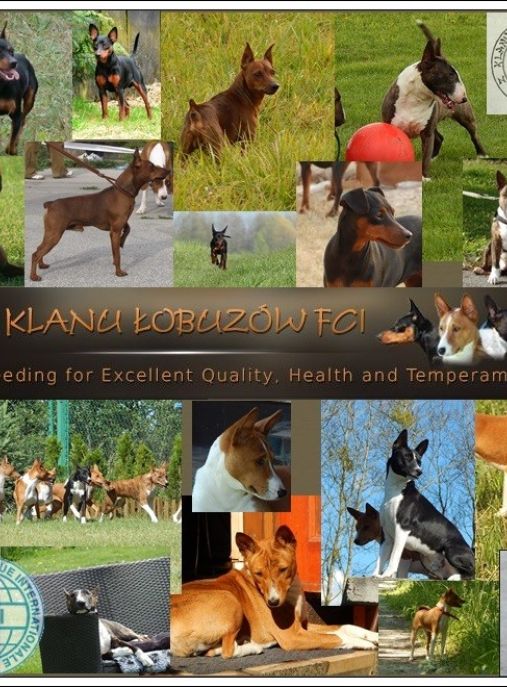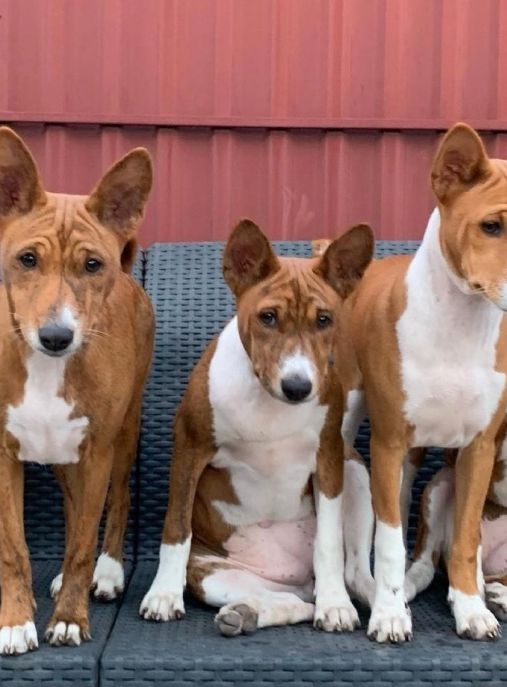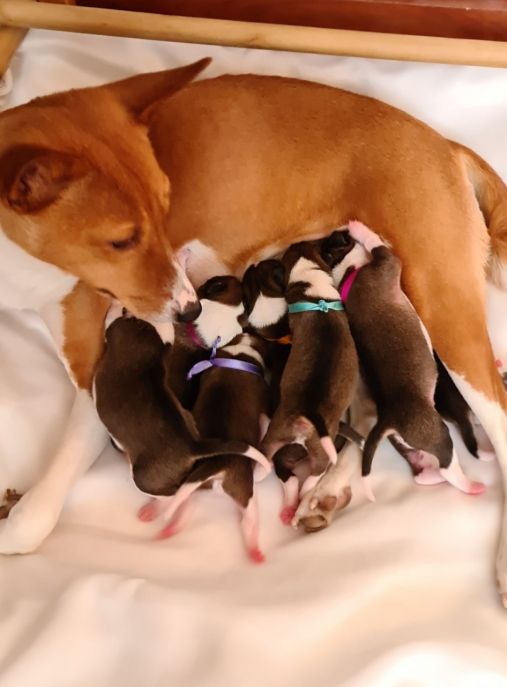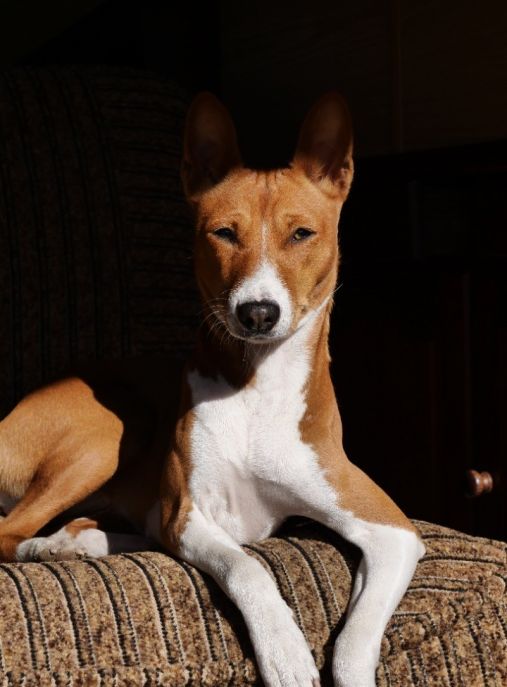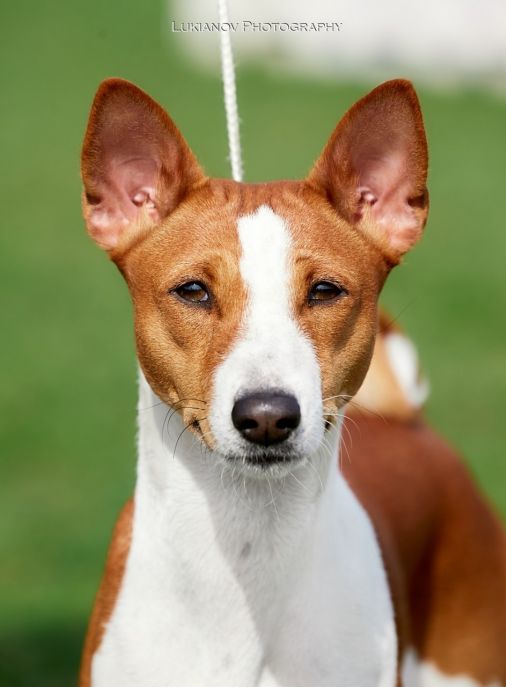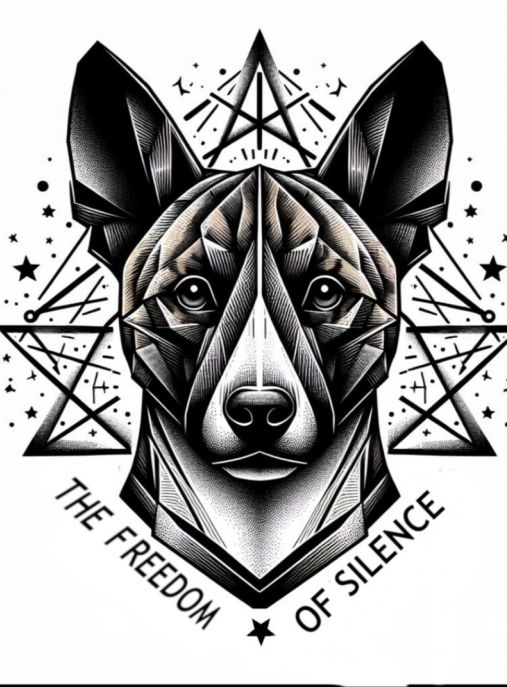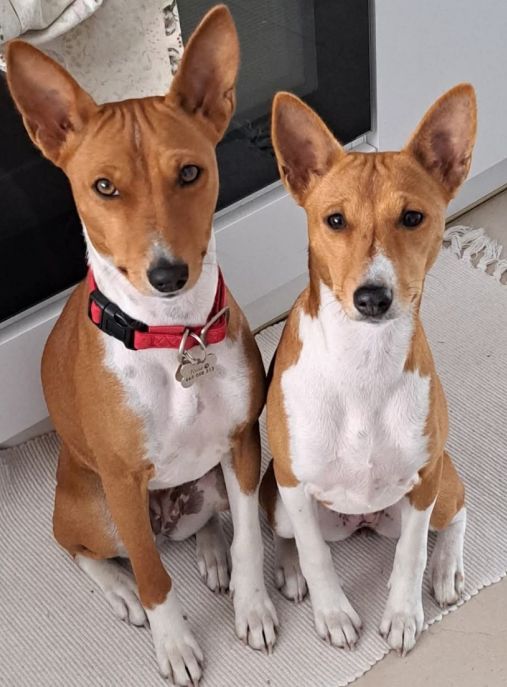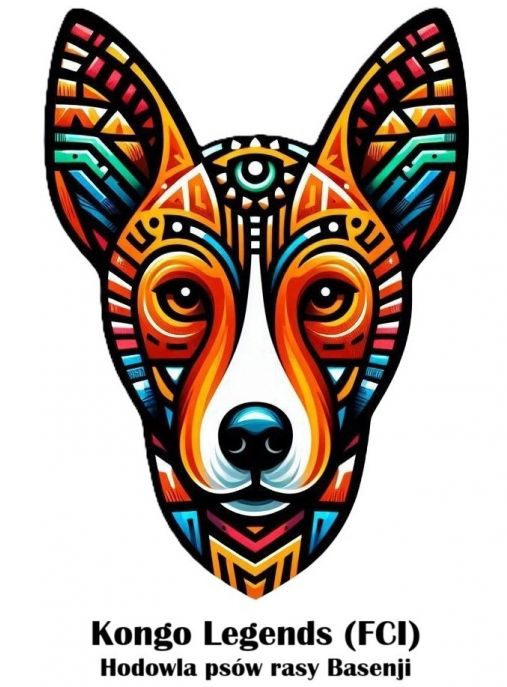The Basenji dog breed is a unique and fascinating breed that has captured the hearts of dog enthusiasts worldwide. Known for their distinctive appearance and intriguing characteristics, Basenjis are often referred to as the "barkless dog" due to their unusual vocalization. In this comprehensive description, we will delve into the history, classification, purpose, physical attributes, and other interesting facts about the Basenji breed.
Originating from Central Africa, the Basenji breed has a rich history that dates back thousands of years. These dogs were highly valued by African tribes for their exceptional hunting skills, agility, and intelligence. Basenjis were primarily used for tracking and chasing small game, such as rodents and birds, making them invaluable companions for hunters in the dense African forests.
According to the FCI (Fédération Cynologique Internationale) typology, the Basenji breed falls under Group 5 - Spitz and Primitive types. This group includes primitive dog breeds that have retained their original characteristics and traits. Basenjis are classified in Section 6 - Primitive type, and their breed standard is outlined by the FCI.
Basenjis are versatile dogs that can serve various purposes. While they were initially bred for hunting, they have also excelled in other roles, such as companionship and competitive dog sports. Their intelligence, agility, and independent nature make them suitable for activities like obedience, agility, and lure coursing. Additionally, their compact size and adaptability make them well-suited for urban living, provided they receive sufficient exercise and mental stimulation.
In terms of physical attributes, Basenjis are medium-sized dogs with a well-muscled body and a distinctive appearance. They have a compact build, with a square-shaped body and a high-set tail that curls over their back. Their head is proportionate to their body, featuring a wrinkled forehead, almond-shaped eyes that convey intelligence, and erect, small-to-medium-sized ears.
One of the most notable characteristics of the Basenji breed is their unique vocalization. Unlike most dogs, Basenjis do not bark. Instead, they produce a range of sounds, including yodels, howls, and chortles. This unique vocalization is a result of their larynx structure, which differs from other dog breeds. While they may not bark, Basenjis are not completely silent and can still make various vocalizations to communicate their needs or express their emotions.
Basenjis have a short, dense coat that comes in various colors, including red, black, tricolor, and brindle. Their coat is low-maintenance, requiring minimal grooming. However, they are known for their cleanliness and meticulous grooming habits, often compared to cats. Basenjis are fastidious self-groomers, frequently seen licking and cleaning themselves.
In terms of size, Basenjis typically weigh between 22 to 26 pounds (10 to 12 kilograms) for males and 20 to 24 pounds (9 to 11 kilograms) for females. They stand at a height of around 16 to 17 inches (41 to 43 centimeters) at the shoulder. These measurements may vary slightly depending on the individual dog and their lineage.
The average life expectancy of a Basenji is around 12 to 14 years, although with proper care and a healthy lifestyle, some individuals have been known to live even longer. It is important to note that Basenjis, like any other breed, may be prone to certain health conditions. Responsible breeders conduct health screenings to minimize the risk of genetic diseases, such as Fanconi syndrome, progressive retinal atrophy (PRA), and hip dysplasia.
Basenjis are known for their independent and intelligent nature. While they are loyal and affectionate with their families, they can also exhibit a stubborn streak. This requires consistent and patient training methods that focus on positive reinforcement. Early socialization is crucial to ensure they develop into well-rounded dogs that are comfortable in various environments and with different people and animals.
In conclusion, the Basenji breed is a captivating and distinctive dog breed with a rich history and unique characteristics. From their African origins as skilled hunters to their adaptability in modern-day living, Basenjis have proven to be versatile companions. Their barkless nature, striking appearance, and intelligence make them a beloved choice for dog enthusiasts seeking a one-of-a-kind canine companion.
Basenji dogs are a unique and fascinating breed known for their distinctive character and behavior. Originating from Central Africa, these dogs have a rich history and possess several distinctive traits that set them apart from other breeds. In this text, we will explore the character of Basenji dogs, their behavior, and provide insights into how to raise and train them effectively.
Basenjis are often described as independent, intelligent, and curious dogs. They have a strong sense of self and are known for their cat-like behavior, including grooming themselves and climbing on furniture. This independent nature can sometimes make them appear aloof or stubborn, but it is important to understand that they are highly intelligent and capable of learning.
One of the most notable characteristics of Basenjis is their unique vocalization. Unlike other dog breeds, Basenjis do not bark. Instead, they produce a range of sounds, including yodels, howls, and even screams. This unique vocalization is a result of their larynx structure and is often referred to as the "Basenji yodel." It is important to note that while they may not bark, Basenjis are still capable of expressing themselves through other means, such as growling or whining.
Basenjis are known for their high energy levels and need for mental and physical stimulation. They are an active breed that requires regular exercise to prevent boredom and destructive behavior. Daily walks, playtime, and interactive toys are essential to keep them engaged and happy. Additionally, providing them with mental challenges, such as puzzle toys or obedience training, can help satisfy their intelligent nature.
When it comes to training, Basenjis can be a bit challenging due to their independent streak. They are known to be intelligent but can also be stubborn and willful. It is crucial to establish yourself as the pack leader and use positive reinforcement techniques, such as treats and praise, to motivate them. Consistency and patience are key when training a Basenji, as they may require more time and repetition to grasp commands compared to other breeds.
Socialization is another crucial aspect of raising a Basenji. Early and ongoing socialization is essential to ensure they are comfortable and well-behaved around other dogs, animals, and people. Exposing them to various environments, sounds, and experiences from a young age will help them develop into well-rounded and confident dogs.
Basenjis are generally good with children and can make excellent family pets. However, due to their independent nature, they may not always be the best choice for first-time dog owners or families with very young children. Supervision and proper introductions are necessary to ensure a harmonious relationship between Basenjis and children.
In conclusion, Basenji dogs possess a unique character that sets them apart from other breeds. Their independent nature, intelligence, and distinctive vocalization make them a fascinating and rewarding breed to own. With proper training, socialization, and exercise, Basenjis can thrive as loving and loyal companions.
The Basenji dog breed is a unique and fascinating breed that requires specific care to ensure their well-being and happiness. Known for their intelligence, independence, and distinctive yodel-like bark, Basenjis are a joy to have as companions. Here are some tips on how to care for Basenji dogs, including what to do and what not to do:
1. Exercise: Basenjis are an active breed that requires regular exercise to maintain their physical and mental health. Daily walks, playtime, and interactive toys are essential to keep them engaged and prevent boredom. However, be cautious when letting them off-leash in unfenced areas, as Basenjis have a strong prey drive and may chase small animals.
2. Mental Stimulation: Basenjis are highly intelligent dogs that thrive on mental challenges. Provide them with puzzle toys, obedience training, and interactive games to keep their minds sharp. Mental stimulation is crucial to prevent destructive behavior that may arise from boredom.
3. Grooming: Basenjis have a short, fine coat that requires minimal grooming. Regular brushing with a soft bristle brush will help keep their coat clean and remove loose hair. They are known for their cleanliness and lack of doggy odor, so bathing should only be done when necessary. However, it's important to regularly check their ears for any signs of infection and trim their nails as needed.
4. Socialization: Early socialization is vital for Basenjis to develop good behavior and adaptability. Introduce them to various people, animals, and environments from a young age to ensure they grow up to be well-rounded dogs. Basenjis can be reserved with strangers, so exposing them to different situations will help them become more comfortable and less prone to anxiety.
5. Positive Reinforcement Training: Basenjis respond best to positive reinforcement training methods. Use rewards such as treats, praise, and playtime to motivate and encourage good behavior. Harsh training techniques or punishment can lead to fear or aggression in this sensitive breed.
6. Secure Fencing: Basenjis are known for their exceptional jumping ability and escape artist tendencies. Ensure your yard has secure fencing that is at least six feet high and has no gaps or weak spots. Basenjis are notorious for exploring, so always supervise them when outside to prevent any potential escapes.
7. Temperature Sensitivity: Basenjis have a short, thin coat and are sensitive to extreme temperatures. They can easily overheat in hot weather, so provide shade, fresh water, and avoid exercising them during the hottest parts of the day. In cold weather, consider using a doggy sweater or coat to keep them warm during walks.
8. Basenji-Proof Your Home: Basenjis are curious and mischievous dogs that love to explore. Ensure your home is Basenji-proofed by removing any hazardous items or plants that they may chew on or ingest. Secure cabinets, trash cans, and electrical cords to prevent accidents.
9. Regular Veterinary Care: Like all dogs, Basenjis require regular veterinary check-ups, vaccinations, and preventive care. Schedule annual wellness exams, keep up with vaccinations, and maintain a proper parasite prevention regimen. Basenjis are generally a healthy breed, but they can be prone to certain conditions such as Fanconi syndrome, so regular monitoring is essential.
10. Time and Attention: Basenjis are a highly social breed that thrives on human companionship. They can become bored and develop destructive behavior if left alone for long periods. Ensure you have enough time and attention to devote to your Basenji, including daily interaction, exercise, and mental stimulation.
In summary, caring for a Basenji requires providing regular exercise, mental stimulation, and socialization. Use positive reinforcement training methods, ensure a secure environment, and be mindful of their temperature sensitivity. With proper care and attention, Basenjis can be wonderful, loyal companions for many years to come.
The Basenji dog, known for its unique characteristics and ancient origins, comes in a variety of colors. However, one of the most common and distinctive colors seen in Basenjis is a rich, warm shade known as red. The red coloration in Basenjis is truly captivating and adds to the breed's overall charm and appeal.
When we talk about the red color in Basenjis, it is important to note that it can vary in intensity and depth. The shade can range from a light, golden-red to a deep, mahogany-red, resembling the color of a ripe chestnut. This variation in red hues adds to the individuality of each Basenji, making them even more visually striking.
The red color in Basenjis is typically seen as a solid coat color, covering the entire body uniformly. However, it is not uncommon to find small patches of white on the chest, toes, or tail tip, which only enhance the overall beauty of the dog. These white markings, although minimal, create a pleasing contrast against the rich red background, giving the Basenji a truly regal appearance.
The red color in Basenjis is not limited to their fur alone; it extends to their eyes and nose as well. Basenjis with a red coat often have dark, almond-shaped eyes that perfectly complement their overall appearance. These eyes, usually brown or hazel in color, exude intelligence and curiosity, reflecting the breed's alert and inquisitive nature.
The nose of a red Basenji is typically black, which creates a striking contrast against the warm red coat. This black nose adds a touch of elegance to the dog's face, enhancing its overall beauty and giving it a distinct and refined look.
One of the most fascinating aspects of the red color in Basenjis is its ability to change and evolve as the dog matures. Puppies often have a lighter, more vibrant shade of red, which gradually deepens and becomes richer as they grow older. This transformation adds an element of surprise and excitement, as the red coat continues to develop and reveal its true beauty over time.
In conclusion, the red color in Basenjis is a captivating and distinctive feature that sets this breed apart. Ranging from light golden-red to deep mahogany-red, the red coat covers the entire body uniformly, with minimal white markings. The dark, almond-shaped eyes and black nose perfectly complement the warm red color, adding to the breed's overall elegance and allure. As the Basenji matures, the red coat deepens, revealing its true beauty and making these dogs truly mesmerizing to behold.
Basenji dogs are known for their unique characteristics and overall good health. However, like any other breed, they are susceptible to certain health issues. Understanding the common diseases found in Basenjis and taking appropriate care can help ensure their well-being. In this text, we will explore the health of Basenji dogs, including prevalent diseases and tips for maintaining their health.
Basenjis are generally a healthy breed with a lifespan of around 12 to 16 years. They are known for their intelligence, agility, and affectionate nature. However, there are a few health conditions that are more commonly seen in Basenjis compared to other breeds.
One of the most prevalent health concerns in Basenjis is Fanconi syndrome. This is a genetic disorder that affects the kidneys' ability to reabsorb essential nutrients, leading to excessive loss of glucose, electrolytes, and other vital substances in the urine. Symptoms of Fanconi syndrome include excessive thirst, frequent urination, weight loss, and poor coat condition. Regular monitoring of urine glucose levels and a specialized diet can help manage this condition.
Another common health issue in Basenjis is progressive retinal atrophy (PRA). PRA is a degenerative eye disease that leads to gradual vision loss and, in severe cases, blindness. Regular eye examinations by a veterinary ophthalmologist can help detect PRA early on, allowing for appropriate management and lifestyle adjustments to accommodate the dog's visual impairment.
Basenjis are also prone to certain skin conditions, including allergies and dermatitis. These can manifest as itching, redness, rashes, and hair loss. Regular grooming, including bathing and brushing, can help maintain healthy skin and coat. Additionally, identifying and avoiding potential allergens, such as certain foods or environmental triggers, can help manage these conditions.
Like many other breeds, Basenjis can also be affected by hip dysplasia, a condition where the hip joint doesn't develop properly, leading to pain, lameness, and arthritis. Regular exercise, a balanced diet, and maintaining a healthy weight can help reduce the risk and severity of hip dysplasia. Responsible breeders often screen their breeding dogs for hip dysplasia to minimize the occurrence of this condition in their offspring.
To ensure the overall health of Basenji dogs, regular veterinary check-ups are essential. Routine vaccinations, parasite prevention, and dental care are crucial aspects of their healthcare. A nutritious diet tailored to their specific needs, including high-quality dog food and appropriate portion control, is vital for maintaining a healthy weight and preventing obesity-related issues.
Exercise is also important for Basenjis, as they are an active breed. Regular walks, playtime, and mental stimulation help keep them physically fit and mentally engaged. However, it's important to note that Basenjis have a strong prey drive and should be kept on a leash or in a securely fenced area to prevent them from chasing small animals.
In conclusion, Basenji dogs are generally healthy, but they can be prone to certain genetic and breed-specific health conditions. Regular veterinary care, including screenings for genetic disorders, along with a balanced diet, exercise, and proper grooming, can help maintain their overall health and well-being. By being proactive in their care, Basenji owners can ensure their furry companions live long, happy, and healthy lives.
The Basenji dog breed is known for its unique characteristics and nutritional needs. As a responsible dog owner, it is crucial to understand the specific dietary requirements of Basenjis to ensure their overall health and well-being. Here is an extensive description of Basenji dog nutrition, along with advice on what and how to feed them, as well as things to avoid.
Basenjis are a small to medium-sized breed with a lean and muscular build. They are highly active and energetic, requiring a well-balanced diet to support their daily activities. The primary components of a Basenji's diet should include high-quality protein, healthy fats, complex carbohydrates, vitamins, and minerals.
Protein is essential for muscle development and repair. It is recommended to feed Basenjis a diet that consists of at least 25-30% protein. Good sources of protein for Basenjis include lean meats like chicken, turkey, and fish. Avoid feeding them processed meats or those high in fat, as it can lead to weight gain and other health issues.
Healthy fats are crucial for Basenjis as they provide energy and support the absorption of fat-soluble vitamins. Incorporate fats from sources like fish oil, flaxseed oil, or coconut oil into their diet. However, it is important to monitor the fat intake to prevent obesity.
Complex carbohydrates are an excellent source of energy for Basenjis. Opt for whole grains like brown rice, quinoa, and oats, which provide essential nutrients and dietary fiber. Avoid feeding them refined grains or foods high in sugar, as it can lead to weight gain and dental problems.
Vitamins and minerals play a vital role in a Basenji's overall health. Ensure their diet includes a variety of fruits and vegetables, such as carrots, spinach, blueberries, and apples. These provide essential vitamins, antioxidants, and fiber. However, some fruits like grapes and raisins can be toxic to dogs, so it is important to avoid them.
Feeding frequency and portion control are also important factors to consider. Basenjis should be fed two to three small meals a day to prevent bloating and maintain a healthy metabolism. The portion size should be appropriate for their age, weight, and activity level. Consult with a veterinarian to determine the right amount of food for your Basenji.
It is crucial to avoid certain foods that can be harmful or toxic to Basenjis. Some common foods to avoid include chocolate, caffeine, onions, garlic, avocados, and alcohol. These can cause various health issues ranging from gastrointestinal problems to organ damage.
Additionally, Basenjis are prone to certain health conditions like food allergies and sensitivities. If you notice any signs of allergies, such as itching, digestive issues, or skin problems, consult with a veterinarian to identify the allergen and adjust their diet accordingly.
In conclusion, providing a well-balanced and nutritious diet is essential for the health and well-being of Basenji dogs. Focus on high-quality protein, healthy fats, complex carbohydrates, vitamins, and minerals. Feed them small, frequent meals and avoid harmful foods. By following these guidelines and consulting with a veterinarian, you can ensure that your Basenji receives the optimal nutrition it needs to thrive.



